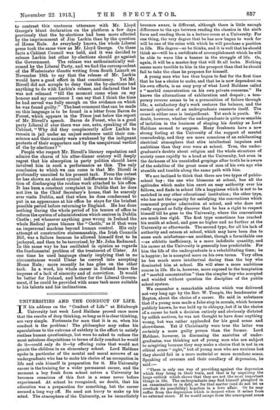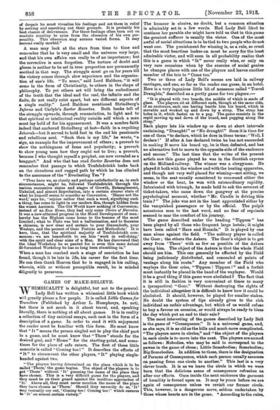UNIVERSITIES AND THE CONDUCT OF LIFE.
IN his address on the "Conduct of Life" at Edinburgh University last week Lord Haldane proved once more that the results of deep thinking, so long as it is clear thinking, are very simple. Fortunate for man that it is so, when his conduct is the problem ! The philosopher may refine his speculations to the extreme of subtlety in the effort to satisfy restless human questionings, but were he asked to reduce the most nebulous disquisitions to terms of daily conduct he would do it—could only do it—by offering rules that would not puzzle the children in an elementary school. Lord Haldane spoke in particular of the mental and moral sorrows of an undergraduate who has to make his choice of an occupation in life and rule himself in preparation for it. His University career is the training for a wider permanent career, and the moment a boy fresh from school enters a University he becomes conscious of this fact in a sense never before experienced. At school be recognized, no doubt, that his education was a preparation for something, but the career seemed a long way off. He need not hurry to make up his mind. The atmosphere of the University, as he immediately
becomes aware, is different, although there is little enough difference to the eye between reading the classics in the sixth form and reading them in a lecture-room at a University. For one thing, the very degree that be has now begun to work for will be one of the coins with which he will purchase a position in life. His degree—so he thinks, and it is well that he should think so—will be a certificate of accomplishment which he will be able to wave like a banner in the struggle of life. Or, again, it will be a master-key that will fit all locks. Nothing seems more terrible to him in the prospect than that he should fail to take the class he proposes for himself.
A young man who has thus begun to feel for the first time that he has a choice to make, and that he is now dependent on his own efforts, is an easy prey of what Lord Haldane called a "morbid concentration on his own private concerns." He knows the alternations of exhilaration and despair ; a tem- porary reverse seems to be a premonition of failure through life; a satisfactory day's work restores the balance, and the normal optimism of an undergraduate reasserts itself. The cause in either case is insignificant. Yet such is youth. We doubt, however, whether the undergraduate is quite so sensible of isolation in the business of shaping his destiny as Lord
Haldane seemed to suppose. Many freshmen have a new strong feeling at the University of the support of mental comradeship, and they are more conscious of an exhilarating electrical atmosphere that stirs intellectual impulses and ambitions than they ever were at school. True, the under-
graduate's doubts about religion and the whole structure of society come rapidly to a head at the University, but even in the darkness of his unsatisfied gropings after truth he is aware of the sodalitas of the great mass of men of his own age who stumble and tumble along the same path with him.
We are inclined to think that there are two types of public- school boy : the one who blossoms at school, has all the aptitudes which make him exert an easy authority over his
fellows, and finds in school life a happiness which is not to be matched in any other educational institution ; the other type, who has not the capacity for satisfying the conventions which command popular admiration at school, and who does not really expand or fully discover that he has a right to respect himself till he goes to the University, where the conventions are much less rigid. The first type sometimes has reached his zenith at school, and goes no higher and no further at the University or afterwards. The second type, for all his lack of authority and esteem at school, which may have been due to some such misfortune—an accident, though a formidable one —as athletic inefficiency, is a more indefinite quantity, and his career at the University is generally less predictable. For him the life of the undergraduate is a rehabilitating time; be is happier; he is accepted more on his own terms. Very often be has much more intellectual daring than the boy who dominated him at school. He will steer a more ambitious course in life. He is, however, more exposed to the temptation of "morbid concentration" than the simpler boy who accepted and wielded without question the discipline of the public school system.
We remember a remarkable address which was delivered not very long ago by the Rev. W. Temple, the headmaster of Repton, about the choice of a career. He said in substance that if a young man made a false step in morals, which became publicly known, he was held up to obloquy, but if in the choice of a career he took a decision entirely and obviously dictated by selfish motives, he was not thought to have done anything wrong, but was rather applauded for his good sense and shrewdness. Yet if Christianity were true the latter was certainly a more guilty person than the former. Lord Haldane, however, in discussing the anxieties of under- graduates, was thinking not of young men who are subject to misgiving because they may make a choice that is not in an
ethical sense " right," but of young men who are anxious lest they should fail in a more material or more mundane sense. Speaking of reverses and their corollary of depression, he said :— " There is only one way of providing against the depression which they bring in their train, and that is by acquiring the large outlook which shows that they are not the most important things in life. The undergraduate may find himself ploughed in an examination or in debt, or for that matter (and do not let us overlook its possibility) hopeless in a love affair. Or he may suffer from the depression which is deepest when it arises from no external cause. If he would escape from the consequent sense of despair he must visualize his feelings and set them in relief by seeking and searching out their grounds. It is probably his best chance of deliverance. For these feelings often turn out on resolute scrutiny to arise from tho obsession of his own per- sonality. This obsession may assume varied forms. It may become really morbid."
A. man may look at the stars from time to time and remember that he is very small and the universe very large, and that his own affairs can really be of no importance ; but the corrective is soon forgotten. The torture of doubt and gloom is neither to be set in true proportion nor permanently soothed in that way. The struggle must go on for years till the victory comes through slow experience and the organisa- tion of one's life. "To some," said Lord Haldane, "it will come in the form of Christianity, to others in the shape of philosophy. To yet others art will bring the embodiment of the truth that the ideal and the real, the infinite and the finite, do not really exist apart, but are different aspects of a single reality." Lord Haldane mentioned Strindberg's Inferno and Carlyle's Barter Resartus. Both books tell of the struggle upwards, through renunciation, to light and to that spiritual or intellectual reality outside self which a man must lay hold of for his appeasement. It was a sombre faith indeed that anchored Strindberg at last—faith in a requiting Jehovah—but it served to hold fast in the end his passionate and rebellious soul. "Such then is my life," he wrote, "a sign, an example for the improvement of others ; a proverb to show the nothingness of fame and popularity; a proverb to show young men how they ought not to live; a proverb, because I who thought myself a prophet, am now revealed as a braggart." And who that has read Sailor Besartus does not remember that passage in which Teufelsdrockh looks back on the circuitous and rugged path by which he has climbed to the assurance of the "Everlasting Yea "?
"Thus have we, as closely and perhaps satisfactorily as, in such circumstances, might be, followed Teufelsdrockh through the various successive states and stages of Growth, Entanglement, Unbelief, and almost Reprobation, into a certain clearer state of what he himself seems to consider as Conversion. 'Blame not the word,' says be; 'rejoice rather that such a word, signifying such a thing, has come to light in our modern Era, though hidden from the wisest Ancients. The Old World knew nothing of Conversion; instead of an Ecce Homo, they had only some Choice of Hercules. It was a new-attained progress in the Moral Development of man: hereby has the Highest come home to the bosoms of the most Limited; what to Plato was but a hallucination, and to Socrates a chimera, is now clear and certain to your Zinzendorfs, your Wesleys, and the poorest of their Pietists and Methodists.' It is here, then, that the spiritual majority of Teufelsdrockh com- mences: we are henceforth to see him work in well-doing,' with the spirit and clear aims of a Man. He has discovered that the Ideal Workshop he so panted for is even this same Actual ill-furnished Workshop he has so long been stumbling in."
When a man has reached such a stage of conviction he has found, though it be late in life, his career for the first time. He can then thank Heaven that he is engaged in his calling, wherein, with or without perceptible result, he is minded diligently to persevere.



















































 Previous page
Previous page